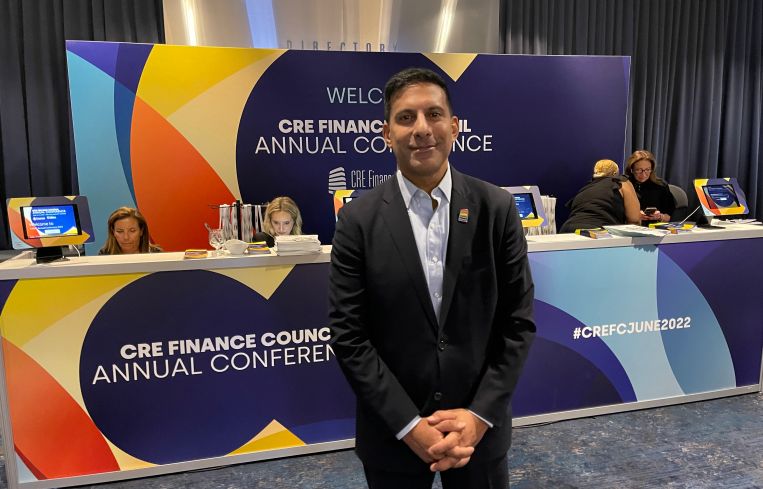Five Questions With NYU’s Sam Chandan at CREFC 2022

As someone who has been attending the CREFC conferences for the past 15 years, Sam Chandan is a big fan of the organization. As the new head of NYU Stern’s Center for Real Estate, he has been encouraging all his students to become members of the trade association, too.
Chandan chatted with Commercial Observer at our booth in the New York Marriott Marquis. He shared his view on recession concerns, the multifamily sector, and why New York City will always keep its crown as the leading finance and real estate market.
This interview has been edited for clarity and length.
What’s your history with CREFC?
I’ve worked with CREFC over the last several years. In my previous role at Schack [Institute of Real Estate], we partnered with CREFC to create a new research institute. CREFC made a substantial gift to NYU to support it. My relationship with CREFC has changed now that I’m at Stern, but I’ve worked with them on a whole range of different projects, and I’ve been an active member. It’s just an amazing organization. One of the things I really appreciate is that CREFC has gone out of its way to really build out its inclusion programming. June being Pride Month, CREFC is hosting a number of different pride events. As an organization, the work that they’re doing to balance the visibility of women, people of color, and people who identify as LGBTQ in the industry is really setting the standard for what we could be doing as an industry. And I know myself and all my students are really grateful for all their efforts.
What are your thoughts on today’s economic environment?
We have significant downward adjustments. We’re in a bear market today. On the first day of the conference, we had a rather significant decline in the market indices, part of what that reflects is the tightening of monetary policy in a way that is intended to raise the cost of capital, lower the pace of investment and change some of those inflationary pressures. Part of what I think we see as a concern is a conflict emerging between monetary policy and fiscal policy. So we see elected officials, in particular the Democrats in the White House, pushing very hard to ensure that we continue to move forward on meaningful job creation and investment programs.
Unfortunately, for the short to medium term, those programs have the potential to be significantly inflationary. Going into a midterm election season, there’s a strong desire to see continued meaningful visible job growth and expansion in the economy, but that is at odds with what we see monetary policymakers trying to do— the incentive there is to try to offset some of what we see happening with fiscal policy. Historically, that conflict between monetary and fiscal policy has not been conducive to a soft landing in the broader economy. So, I think this is why we now see concerns around the potential for a recession. That is a self-fulfilling prophecy, if enough people believe that a recession is in the offing, or recession is likely in the third or fourth quarters, they adjust their investment in their hiring behaviors, in a way that itself drives that contraction. So, people’s expectations of how the economy might perform over the course of the next six to nine months lead to adjustments in behavior.
How is that going to impact the CRE market?
Nothing we see markets really responding to right now. There’s certainly variation across property types. The multifamily sector continued to show incredible resilience. There’s an increasing but still very manageable supply pipeline, there’s no risk of oversight, there’s no serious risk of oversupply in the market right now. The risk is that in major urban cores around the country, with continued deterioration and affordability for workforce housing, rents are continuing to rise far faster than wages. And that is driving a lot of folks to have to adjust their spending activity. As we move into local elections, in some jurisdictions, and in many urban courts around the country, we’re going to see a greater push for rent control and rent stabilization interventions to lower the pace of rent increases. This has the potential to be a more significant political issue in the midterm elections. And that is something that I think as an industry, we have to continue to watch closely.
What’s your view on New York City as a market?
I wouldn’t write off New York or the Northeast markets. Our [New York] challenge as a market over the course of the next decade is going to be public and private sector leadership, focusing investments in ways that really reinforce the core strengths of New York City. There is no city in the world that offers the agglomeration economies or the co-location strengths that New York offers. But those are things that we need to continue to invest in and reinforce to ensure that New York remains as it should, the world’s leading financial and real estate market.
Emily Fu can be reached at efu@commercialobserver.com.



